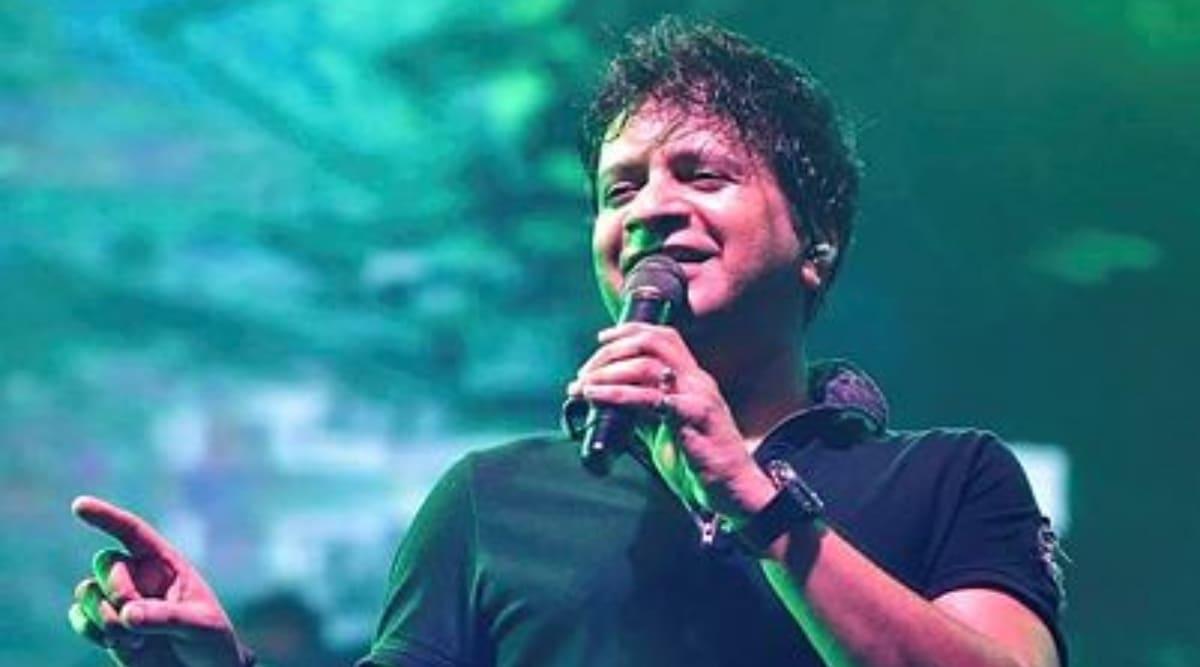 Bollywood playback singer Krishnakumar Kunnath, popularly known as 'KK' during his performance, at Nazrul Mancha in Kolkata, Tuesday, May 31, 2022. (PTI)
Bollywood playback singer Krishnakumar Kunnath, popularly known as 'KK' during his performance, at Nazrul Mancha in Kolkata, Tuesday, May 31, 2022. (PTI)As a millennial, I have dealt with love in the way it is supposed to be dealt with: Cold at first, warm a little later, to cold-blooded in the end. KK (Krishnakumar Kunnath) kept singing in the background of my life, with lyrics that also resonated with others from my generation.
On a chilly evening, as a low-functioning adult, I met a date over drinks, and decided to reach out to my KK-loaded playlist, with ‘Aawarapan’ (Jism), ‘Maine Dil Se Kaha’ (Rog), ‘Bas Ek Pal’ (Bas Ek Pal) and ‘Kya Mujhe Pyaar Hai’ (Woh Lamhe…). We bonded and wondered why we had not met each other before. We laughed about how KK’s ‘Tadap Tadap’ from Hum Dil De Chuke Sanam, became the anthem for unrequited love, while ‘Yaaron’ was the farewell anthem at every school. In the 4-6 minutes that a song lasted, it made us believe in love.
I was barely a teenager when KK released his studio album Pal. I quietly listened to the title track on my brother’s Walkman, alternating between daydreams and the knowledge that everything comes down to memories. Then, as a wannabe-adult whose heart had already been stomped on, I watched Nagesh Kukunoor’s Rockford. There was more reason to mope now, with KK’s ‘Yaaron’, because pyaar dosti hai (love is friendship).
At no point did I wonder why I did not hear more of this unparalleled singer in the media, even though his songs were tailor-made for hopeless romantics like me. I am speaking of a time, between the ’90s and early 2000s, when heartbreak was not fashionable, boys were creatures you did not interact with in public, “awkward” was every teenager’s middle name and parents were people you hid all of this from. This was when ‘Pal’ hit the radio and remained on top of our playlists for months on end.
Best of Express Premium
Later, I finally decided to figure out KK, thanks to Google. From the many interviews I read and watched as a fan, his demeanour as a singer hardly stood out. In his promotions, if and when he did any, it seemed like a gun had been held over the teleprompter at him. In an interview from as late as 2018, when he was already an established name in Hindi pop and Bollywood, he reportedly said that often people did not recognise him at concerts, and wondered if he really was the person who sang with so much passion.
In his only appearance as a “singer/hero” in ‘Aap Ki Dua’ (Pal), he serenades his crush, before erupting into a stage performance. Unlike his contemporary Sonu Nigam, whose voice was an extension of his personality, KK truly understood what it meant to lend his voice: To characters, tunes and awkward teenagers. When ‘Tu Hi Meri Shab Hai’ (Gangster) came on the radio, you needed to stay in the room, because you did not know when you might hear it again. In his own words, he “was never in awe of things, and was only concerned with the music”. KK, the anonymous singer, helped a generation articulate their love. With his passing comes the realisation that a part of the Indian millennial has also died with him.
anuradha.vellat@expressindia.com
- The Indian Express website has been rated GREEN for its credibility and trustworthiness by Newsguard, a global service that rates news sources for their journalistic standards.

